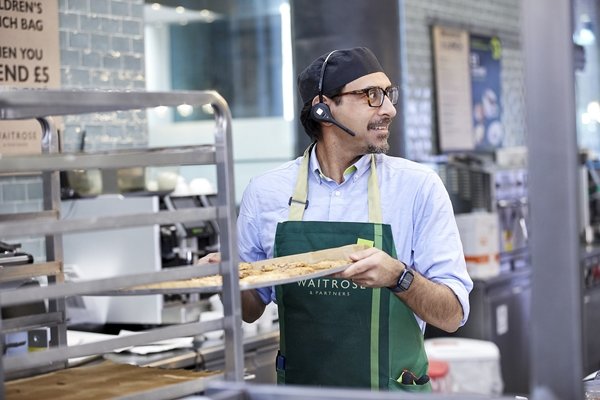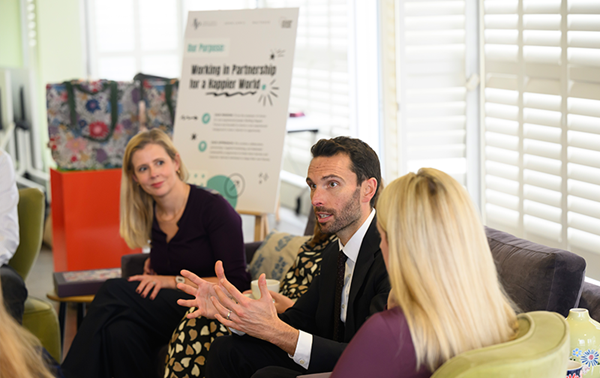Speech to the Employee Ownership Association by Sharon White, Chairman, John Lewis Partnership
Enduring values; transforming business
June 7, 2023
Pleasure to be here this afternoon.
Many thanks to Arup for hosting us today.
And to the EoA.
The Partnership is proud to have been a member for 20 years.
I want to talk this afternoon about how a 100 year old Partnership is transforming itself in today’s highly competitive market by staying true to our enduring values.
Enduring values
The Partnership was started as a radical experiment in industrial democracy.
The founder - Spedan Lewis, whose father opened the eponymous shop on Oxford Street - believed that those who worked for the business should share in its returns.
He believed workers should have real understanding of the business and a say in how it is run.
Behind his father’s back, and over decades, he worked steadily to gift the Partnership to its workers, or Partners.
The status of the Partnership as an employee owned business was sealed by two Trust Settlements - 1929 and 1950.
Spedan talked about the purpose of the Partnership as:‘the happiness of its members. True happiness requires a sense of honest service to the general community, a sense of being some use in the world.’
We’ve brought those words up to date.
Today, we talk of ‘happier people; a happier business and a happier world’.
The words may be different.
But the values are the same.
A commitment to people: Partners, customers and the local community.
And crucially a democracy.
The Chairman is accountable to a Council of around 60 elected Partners, many of them frontline Partners.
Since 1919 the Chairman - as a matter of routine- reports to Council on how the Partnership is performing.
A 35 page Constitution governs how the Partnership operates, which Council can amend through a democratic vote.
A bonus scheme that pays out the same proportion of salary whoever you are in the Partnership.
No add-on profit-related bonuses for individuals or teams.
No long term incentive plans for executives.
Today the Partnership has two of the best loved brands in the UK: Waitrose and John Lewis 20 million customers, 70,000 Partners.
The strength of those brands is rooted in - not incidental - to the model.
You can trust us.
We’re not perfect.
But you can be confident that we are trying to do the right thing.
It’s why even the most seasoned retailers talk in almost religious terms about the Partnership: ‘The Soul of the Partnership’.
It’s why the business is as much a national institution as the BBC or the NHS.
And explains the public debate in recent weeks about the Partnership.
Our customers and the country feel like they own part of the Partnership - that they have a stake.
That is an extraordinarily privileged position to be in as a business.
Transforming business
Spedan described the Partnership as an ‘ongoing experiment’.
It speaks to the fact that an unconventional business model has to be innovative and efficient to survive.
Spedan himself was highly entrepreneurial.
He set up and closed a new venture in South Africa.
Bought several regional department stores before World War Two, fearful the London stores would be bombed.
Bought Waitrose (originally as the catering service for a new hotels business that never took off).
That entrepreneurial spirit lives on.
Joining forces with Ocado for Waitrose home delivery.
Acquiring buy.com, which became John Lewis online.
Setting up the UK’s first ever automated warehouse.
Driven by a desire to take the Partnership nationwide, the business entered a period of rapid expansion between 2000 and 2015.
The number of Partners grew by 40,000 to 90,000.
John Lewis almost doubled its stores from 25 to 43 (and to 50 at its peak).
Waitrose went from 126 to 336 branches including the acquisition of 19 Safeway stores.
The growth was financed by two public bonds of £300m each, payable in 2025 and 2034.
Sales grew from £4bn to 10.8bn but profits stayed the same, as retail margins were hit by the entry of the discounters into UK grocery and by the growth of online shopping.
Profit per Partner fell significantly.
Over this period, the Partnership bonus averaged 14%.
Net debt rose from £1bn to 3.7bn and the debt ratio widened from 3.6 to 4.8 times.
There then followed a period of austerity from 2015 to 2020.
The closure of the defined benefit pension scheme.
A lower bonus, averaging 5%.
Investment reined in to preserve cash and strengthen the balance sheet.
A fundamental reorganisation moving Waitrose and John Lewis from lines of business into group-wide structures to drive efficiencies and synergies.

Today’s transformation
The Partnership continues to transform in a highly competitive and unusual market.
Shaped by two once in a generation events in the past three years: a global pandemic and a cost of living crisis.
Regrettably, many retailers did not make it.
The John Lewis Partnership has come through - and has a clear plan for the future.
The five year Partnership Plan, which began in 2021, will get the Partnership back to sustainable profit.
It aims for a broadly based business with brilliant retail at the core, built on excellent customer service, quality and ethics.
Significant focus in the last three years has been on improving the business fundamentals.
Tackling excess physical space - 16 John Lewis and 13 Waitrose branches closed.
Restarting the store refresh programme - 41 Waitrose stores so far, and more to do.
Retiring Never Knowingly Undersold - a price promise that did not work in the online world.
Investing in better understanding of our customers and how they like to shop so we can be more tailored.
Reducing our cost base. £300m efficiencies so far and another £600m to go.
Step-by-step, returning Waitrose and John Lewis to lines of business supported by group functions.
A bonus paid when affordable.
And not forgetting who we are:
Almost a thousand Partners currently gaining new skills on apprenticeships.
A new long term commitment to provide jobs and skills in the Partnership for young people who have experienced the care system.
I want the Partnership to be a place of opportunity for people who have grown up in care in the same way that Timpsons is for ex offenders.
For our customers, John Lewis and Waitrose continue to drive hard on service, quality and ethics.
Adapting as shopping habits continue to evolve post Covid and with a rush to value as inflation stays high.
Many of our customers are prioritising travel and days out, though spending on hospitality and eating out are starting to wane.
They are cost conscious but prepared to spend on the things that matter to them.
John Lewis
The high street is starting to come back.
55% of purchases in John Lewis are online (down from a peak of 70%).
250 new brands in the last year.
New brands like Soeur, Rag & Bone and Virtue.
Fashion rental with the likes of & Other Stories and emerging brands like Elliatt.
Improved styling and design of own brand fashion and home.
Refreshed half of our stores, invested in new family friendly spaces and 50 new kids’ brands across toys and fashion.
Partners trained in our new school of service.
There is more to do to get service consistently excellent and that’s a big focus this year.
Introduced more sustainable sourcing plus rental and recycling options.
Waitrose
Customers are mostly shopping Waitrose in store but an important minority have stayed online (now 13% down from a peak of 20% during the pandemic).
Waitrose already has the highest animal welfare standards of any major grocer in the world.
Underpinned by a long term commitment to UK farming and to paying farmers fairly.
And we’re being bolder in our messages to customers about the standards we set.
We’re now the only major grocer with a full fish, meat and deli counter service.
New exclusive, sustainable brands like Plants by Ella introduced.
New £100m price investment - even better value with no compromise on values.
Waitrose to more customers through tie-ups with Deliveroo, Dobbies and Shell.
More than retail
Spedan envisaged the Partnership as a ‘variety of businesses’ operating in different sectors to manage the risk of any one business failing.
Over time the Partnership will continue to diversify.
Expanding its financial services business (begun twenty years ago).
Developing build-to-rent with the support of abrdn (the Partnership built its first property in 1944).
Not only do we have a track record but customers trust us to deliver.
Funding the transformation.
I wanted to touch on funding.
As an employee-owned business the Partnership has for decades funded itself from the cash generated by trading, from asset sales and debt.
A conventional business would be able to access shareholder funding.
In a member organisation - where Partners are effectively shareholders - that avenue is not open to us.
We have for many years found creative ways to partner with other companies using some of their capital and expertise to provide new services and enter new markets.
Ocado is a case in point.
The Partnership Plan assumes this funding approach continues.
There are clearly risks, however.
The economic environment remains uncertain.
And the scale of investment needed by the Partnership in areas like technology and the Waitrose supply chain is greater after the business’s rapid expansion and period of austerity.
The ‘tragedy’ would be to walk past what needs to be done to ensure the Partnership has the fuel it needs to invest, transform and grow.
If the Partnership could not fund all of the Plan by itself, the Board could look at whether external investment was needed.
Any arrangement would have to be in line with the Trust Settlements, which guarantee employee-ownership and that Partners share in the profits.
Employee-ownership is a given.
What makes us special is not incidental to being a Partnership.
It’s because we’re a Partnership.
Conclusion
The Partnership is transforming by staying true to its enduring values.
Unapologetic about what we stand for.
That’s what our customers have come to expect.
A business built on kinder capitalism.
Responsible capitalism needs to adapt to the modern era.
No business can stand still.
The road isn’t easy. Things worth fighting for rarely are.
But I could not be more confident that we will prevail.





